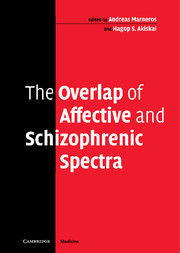Book contents
- Frontmatter
- Contents
- List of contributors
- Preface
- 1 The paradigma of overlapping affective and schizophrenic spectra: schizoaffective conditions
- 2 The overlapping of the spectra: overlapping genes and genetic models
- 3 The continuum of psychosis and its genetic basis
- 4 Functional psychoses: molecular-genetic evidence for a continuum
- 5 State- and trait-related deficits in sustained attention in bipolar disorder: are there any overlaps with schizophrenia?
- 6 The concept of schizoaffective disorder: utility versus validity and reliability – a transcultural perspective
- 7 Phenomenological approaches to the schizoaffective spectrum
- 8 Clinical course of schizoaffective disorders
- 9 Depressive syndromes in schizophrenia
- 10 The overlapping of the spectra: brief and acute psychoses
- 11 Overlapping of the spectra: physical comorbidity between schizophrenia and affective disorders
- 12 The overlapping of the spectra suicide
- 13 Biological treatment of schizoaffective disorders
- 14 Psychological therapies and schizoaffective disorders
- Epilogue: The interface of affective and schizophrenic disorders: a cross between two spectra?
- Index
9 - Depressive syndromes in schizophrenia
Published online by Cambridge University Press: 02 September 2009
- Frontmatter
- Contents
- List of contributors
- Preface
- 1 The paradigma of overlapping affective and schizophrenic spectra: schizoaffective conditions
- 2 The overlapping of the spectra: overlapping genes and genetic models
- 3 The continuum of psychosis and its genetic basis
- 4 Functional psychoses: molecular-genetic evidence for a continuum
- 5 State- and trait-related deficits in sustained attention in bipolar disorder: are there any overlaps with schizophrenia?
- 6 The concept of schizoaffective disorder: utility versus validity and reliability – a transcultural perspective
- 7 Phenomenological approaches to the schizoaffective spectrum
- 8 Clinical course of schizoaffective disorders
- 9 Depressive syndromes in schizophrenia
- 10 The overlapping of the spectra: brief and acute psychoses
- 11 Overlapping of the spectra: physical comorbidity between schizophrenia and affective disorders
- 12 The overlapping of the spectra suicide
- 13 Biological treatment of schizoaffective disorders
- 14 Psychological therapies and schizoaffective disorders
- Epilogue: The interface of affective and schizophrenic disorders: a cross between two spectra?
- Index
Summary
Introduction
Depressive symptoms are frequently observed in schizophrenia. On average, a depression-like syndrome is occurring during the longitudinal course of schizophrenia in about 25% of the patients (Addington et al., 2002). Nevertheless, depressive symptoms do not belong to the diagnostic criteria for schizophrenia (ICD-10, DSM-IV), and it is relatively recently that stronger attempts have been made towards cross-sectional and longitudinal assessment with the new technologies to better understand the course and nature of this syndrome. The question still remains, however, whether depressive symptomatology in schizophrenia is the same as in depression. This question is at the core of this chapter which aims at analyzing similarities and differences in affective-emotional dysfunction in depressive syndromes. The chapter reviews findings from different empirical perspectives and thereby contributes to the ongoing discussion on the nosological specificity of depression in schizophrenia.
Differential diagnosis
According to Siris et al. (2001), differential diagnosis is hampered by difficulties associated with distinguishing between depressive symptomatology and certain features of schizophrenia (particularly negative symptoms), side-effects of treatment (e.g., akinesia), and difficulty of recognizing depression in the presence of florid psychosis. The following chapter gives a short overview on those factors to be considered in the differential diagnosis of depressive symptoms in schizophrenia.
- Type
- Chapter
- Information
- The Overlap of Affective and Schizophrenic Spectra , pp. 156 - 181Publisher: Cambridge University PressPrint publication year: 2006

